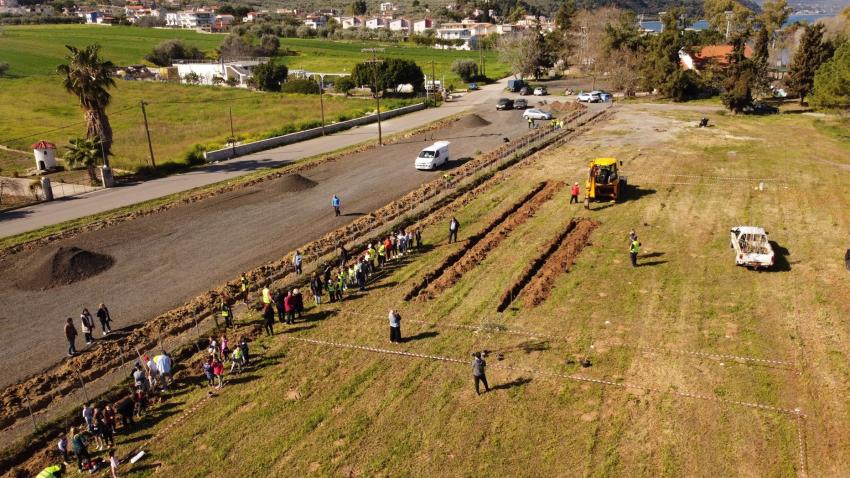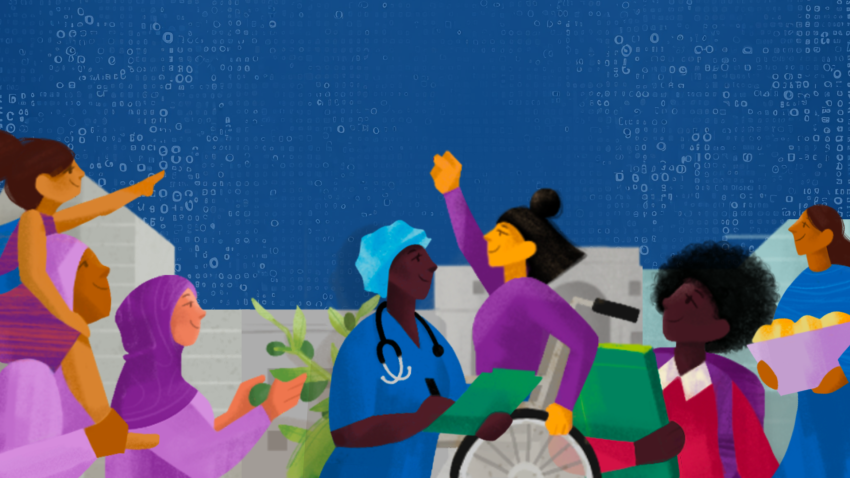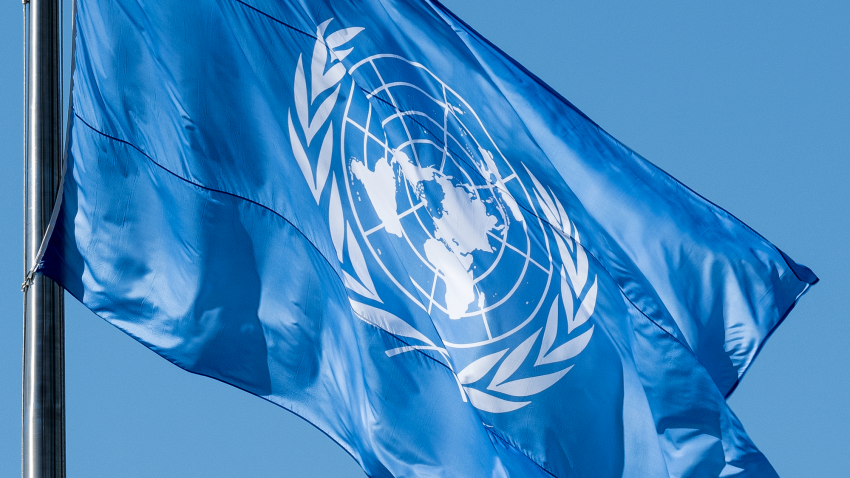Sunday, March 21, marked the dawn of Nowruz, the start of the Persian new year, Farvardin, the first month of the Iranian solar calendar rising with the spring equinox sun, a celebration, in the phrase of António Guterres, “to reflect on the beauty of nature, the promise of spring and the power of culture to build peace.” Images summoned with vernal vivacity in our accompanying photograph today, again by Sundeep Bhutoria, of peace in its truest sense of the absolute absolution of apprehension, of the triumphal trajectory of trust. (Those soaring phrases are, at least in part, an effort to regain the favour of Hawi, the three year old daughter of the gentle and never flappable Brenda Wawa of our UNAI team, who was very cross that I did not choose this image last week.)
Among all the conditions that convened at the creation of the United Nations, and sustained its 75 years, none was as unequivocal and decisive as that of trust, the trust demanded between States and invested by them in a world order, the trust extended to, and reciprocated by, governments from their peoples, the trust here portrayed by Talita Melo of our team, that saw a global organization as a means to extend, and not inhibit, the promise and possibilities of national sovereignty. Indeed, the very concept of “trusteeship” in the Charter was based upon the objective “to promote the political, economic, social, and educational advancement of the inhabitants of the trust territories, and their progressive development towards self-government or independence (through) the freely expressed wishes of the peoples concerned.”
But, above all, trust was about bringing people together, whether in the United Nations General Assembly Hall, its conference rooms or its delegates’ lounge and, beyond that, at the person to person level, through travel and education, particularly in language, a trust that would be the most secure guarantor of peace. As the General Assembly recognized eighteen months ago when it declared 2021 as the “International Year of Peace and Trust”, qualities which “entail accepting differences and having the ability to listen to, recognize, respect and appreciate others, as well as living in a peaceful and united way.” Within months of the resolution’s adoption, the pandemic was upon us, demanding trust in fresher forms, the trust in citizens to behave responsibly towards each other, to protect as much as be protected, the trust in science and vaccine to immunize, the trust in access to them being equitable and not equivocal.
In June last year, Secretary-General Guterres suggested that tourism could “be a platform for overcoming the pandemic. By bringing people together, tourism can promote solidarity and trust - crucial ingredients in advancing the global cooperation that is so urgently needed at this time.” The same month, UNWTO’s Secretary-General Zurab Pololikashvili noted “trust is the new currency of our ‘new normal’. And tourism is ideally positioned to be the vehicle to channel trust. If people trust in governments and in the tourism sector to keep them safe from harm, they will indeed travel tomorrow. As the ultimate person-to-person sector, and one that promotes solidarity and friendship, tourism will play a key role in spreading trust more widely, with benefits traveling far beyond tourism itself. Only this way can we drive our economies back towards growth and start rebuilding our societies.” A thought echoed by Nakul Anand, Executive Director of ITC Limited in India in a conversation at the Prabha Khaitan Foundation that trust “needs to be uncompromising. Processes such as cleaning and making meals, which were done behind the scenes, seamlessly, are now being done in front of the clientele in a way that is safe, exudes warmth and makes the guests feel more trust in the service they are getting.”
In September, exactly a year after the General Assembly resolution, the Executive Council of UNWTO, the World Tourism Organization met in Tbilisi, Georgia at a time when tourism was “one of the hardest hit economic sectors by the COVID-19 pandemic, facing a decline in international tourist arrivals during 2020 of between 58% and 78%, with 100 to 120 million direct tourism jobs at risk.” And what the Council saw as necessary was trust, “trust and confidence among travellers, workers and host communities through the provision of transparent and objective information, as well as the implementation of adequate health, hygiene and safety protocols, with a special focus on promoting inclusion for all travellers…promoting national and regional tourism as well as rural, gastronomy, mountain, nature, heritage, adventure, maritime and coastal tourism and cultural tourism as experiences that add value to local communities, protect the environment and create local benefits.”
In these many linkages between tourism and trust lay an echo of the declaration at the very first General Assembly of the World Tourism Organization, in Madrid in 1975, which spoke of “the physical and moral conditions” in which its work was conducted. It was apt that last year’s UNWTO resolution should have been adopted in Tbilisi, surely one of the loveliest and most magical capitals in the world, a city whose shimmering nocturnal splendour Indira Gandhi once sat up all night gazing upon, from the balcony of the hotel room where she was staying when visiting Georgia with her father, Prime Minister Jawaharlal Nehru, a city enriched by its hospitality to hitherto unfamiliar experience (just last week, as Georgia’s Permanent Representative to the United Nations, Ambassador Kaha Imnadze tweeted landmarks in Tbilisi were lit in green for St Patrick’s Day; nine centuries ago, the Georgian epic poem The Knight in the Panther's Skin included scenes set in the Arab world and in India.) And it was in Tbilisi in 2013, at a conference of the International Association of University Presidents hosted by the President of Caucasus University (and current IAUP President), Kakha Shengelia, that Mark Harris, then President of ELS Education Services, saw another opportunity to shape and nurture trust, the learning of language.
The Many Languages, One World (MLOW) essay contest, co-hosted by ELS and UNAI from 2014-2017, invited university students worldwide to write an essay examining global citizenship, cultural understanding and the role of multilingualism in fostering both. The essay had to be written in one of the six official languages of the United Nations which was not in the student’s first language or primary medium of instruction. Winners of the contest - 250 over the four years - were invited by ELS to United Nations Headquarters for the Global Youth Forum, where they created and presented action plans for the UN’s Sustainable Development Agenda (one of the winners, Irfan Ahmad, has pinned his own presentation in the United Nations General Assembly Hall on his Twitter feed.) Mark recalls the almost instant bond shared between the contestants upon their first meeting, which he described as a “magnetism that was hard to explain; no matter their [different] cultures, their ambitions and desires for humankind are the same,” ambitions and desires rooted in the trust fostered by communication without an interpreter, to be, as 2016 winner Bahati Ernestine put it so poignantly “the voice of the voiceless” seeing MLOW as a way “to amplify my voice on behalf of all refugees on a global scale, (to) break the barriers that I saw ahead of myself because of my refugee status.”
In his 2016 J. Michael Adams lecture, hosted by UNAI, Mark Harris observed “perhaps in an overpopulation of the planet earth, we are now competing for resources in such a way that we no longer wish to tolerate our neighbours. This is not a simply a question of poverty; it’s not a question of hunger; it’s a question of people not tolerating people.” That thought came to mind last Sunday, which was also World Poetry Day, as I read “Remembrance” by United States 2020 Youth Poet Laureate Meera Dasgupta, composed by her especially for the UN Chronicle where she writes
the poet remembers an ocean blooming from dawn
how seeds violently thrown
at the wind can still yawn
wide and well into the shining unknown.
I thought back to World Poetry Day last year, at a time when the seeds of what was to emerge as a pandemic had been violently thrown into a tired and greedy wind that seized a future unknown, its shine dimmed and then slowly, oh so slowly, restored each passing day, but still in danger of eclipse by the competition for resources (read vaccines) and of people not tolerating people (read violence against targeted individuals and groups ) of which Mark spoke so presciently. Like travel , and language, “poetry is a means to traverse oceans and experiences” as Ms. Dasgupta phrases it; as another poet put it, in Ulysses nearly two hundred years ago, “all experience is an arch wherethrough gleams that untravelled world whose margin fades for ever and forever when I move .”
World Poetry Day and Nowruz came just before World Meteorological Day this Wednesday, with its 2021 theme of the oceans, our climate and the weather, launching the United Nations Decade of Ocean Science for Sustainable Development (2021-2030), looking at oceans not as the vast dividers but connectors, Tennyson’s fading margin not the haziness of horizon but the blurring of boundary, the 70% of the earth’s surface they cover bringing the remaining thirty closer to each other, their traverse in itself the forging of familiarity and friendship with the unknown, whether of lands or language, life or lore, personifying each voyager , in the Nowruz words of poet Rumi, that “you are not a drop in the ocean, you are the entire ocean, in a drop.”
We may have sacrificed the Magellanian magic of circumnavigating stormy seas in their quest by flying above them, or by diminishing distances digitally, but the destinations of geography and of the mind endure in their seeking, glimmering, like twilight on tender tide, in the assurance that they will be points from which, like Petula Clark’s “Sailor” we will return home, enriched by the trust we have extended, the trust we have received, much as governments do when they return to national endeavours strengthened by those that are international, inter-people – and in trust.
Ramu Damodaran
Chief, United Nations Academic Impact




